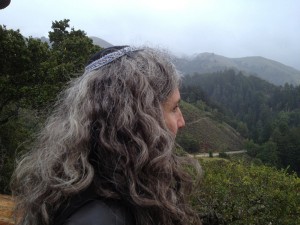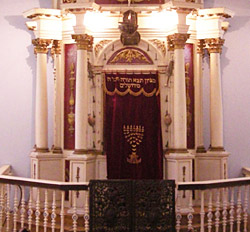
written for HaMakom, Albequerque NM 5780
The Yom Kippur morning Torah reading, Leviticus 16, explains the main 3 atonements that are to be performed by the High Priest. Later, we will davven and enact the rabbinic account of how this Torah ritual was practiced in Temple times, but here we find the root of the practice.
It is a powerful ritual of transformation in which, like many rituals around the world, we get to experience a vicarious death and rebirth. Here, the death of the sacrificial animals, and the ascent of the smoke when they are burnt, allow the community to experience a profound transformation. The process takes place three times, which is also a common cross-cultural magical act, the threefold sealing of a spell.
But our haftorah (Isaiah 57:14-58:14) comes along, and in an appropriately prophetic way, Isaiah challenges us all. Our ritual is meaningless and ineffectual if we ignore the vulnerable. As Isaiah puts it
הֲכָזֶ֗ה יִֽהְיֶה֙ צ֣וֹם אֶבְחָרֵ֔הוּ י֛וֹם עַנּ֥וֹת אָדָ֖ם נַפְשׁ֑וֹ הֲלָכֹ֨ף כְּאַגְמֹ֜ן רֹאשׁ֗וֹ וְשַׂ֤ק וָאֵ֙פֶר֙ יַצִּ֔יעַ הֲלָזֶה֙ תִּקְרָא־צ֔וֹם וְי֥וֹם רָצ֖וֹן לַיהוָֽה׃
Is such the fast I desire, A day for a person to starve their physical souls? Is it bowing the head like a bulrush And lying in sackcloth and ashes? Do you call that a fast, A day of Adonai’s favor?
הֲל֣וֹא זֶה֮ צ֣וֹם אֶבְחָרֵהוּ֒ פַּתֵּ֙חַ֙ חַרְצֻבּ֣וֹת רֶ֔שַׁע הַתֵּ֖ר אֲגֻדּ֣וֹת מוֹטָ֑ה וְשַׁלַּ֤ח רְצוּצִים֙ חָפְשִׁ֔ים וְכָל־מוֹטָ֖ה תְּנַתֵּֽקוּ׃
No, this is the fast I desire: To unlock fetters of wickedness, And untie the cords of the yoke To let the oppressed go free; To break off every yoke.
הֲל֨וֹא פָרֹ֤ס לָֽרָעֵב֙ לַחְמֶ֔ךָ וַעֲנִיִּ֥ים מְרוּדִ֖ים תָּ֣בִיא בָ֑יִת כִּֽי־תִרְאֶ֤ה עָרֹם֙ וְכִסִּית֔וֹ וּמִבְּשָׂרְךָ֖ לֹ֥א תִתְעַלָּֽם׃
It is to share your bread with the hungry, And to take the wretched poor into your home; When you see the naked, to clothe him, And not to ignore your own kin.
Yet, the Zohar comments on the phrase from Leviticus16: “on this day He will atone for you”. In the Zohar (III: 69b), Rabbi Elazar questions this phrase, pointing out that it should have said ‘I will atone for you”, but it says instead, He will atone for you. Rabbi Elazar says the pronoun “he” is referring to the Supernal Mother aspect, Bina (for reasons we don’t have time to go into, having to do with the genderqueer nature of Bina, she is associated with the male aspect called “he”). Bina is also associated with the Jubilee, which would happen every 50 years on Yom Kippur, when all slaves were freed, and all land released. From this liberating Jubilee, which is the supernal Mother, Rabbi Elazar says, flows forth a spring that on Yom Kippur waters every limb, to saturate and satisfy everything, to water everything, and this is the meaning of making atonement for you—that is, for your sake, to cleanse you on this day, as it says further on in the verse in Leviticus 16: “before YHVH you will be purified”. “You will be purified”, says Rabbi Elazar, means judgments should not rule over you. “Before YHVH”, means beyond the level of the divine name YHVH, which is associated with a lower level than Bina. So the purification is coming from that very elevated level of Bina, Understaning, the Supernal Mother. The verse says “Before YHVH you will be purified, “tit’haru”. This verse is the one addition that our liturgy added to the Shma and her blessings for erev Yom Kippur to differntiate it from the way we say it during the rest of the year. It is the essence of Yom Kipuur. And the word tit’haru, you will be purified, is repeated threefold in the Avodah service that we will enact during mussaf today, the part of the service that comes right after the Torah service. Once we have done our own work of teshuvah, any remaining unnecessary sense of remorse is cleared away by the threefold repetition of “tit’haru”, you will be purified, coming from the highest and deepest level we can access.
On this most awesome day of the year, our ritual matters. The material form, the specifics of its practice, matter, because physical reality matters. It matters that 10 days ago was the new moon. It matters that we are keeping Yom Kippur today, and not some other random day of the year. Even though on this day, we let go of all coordinates of time, space and self, and drop everything, nonetheless, we follow a very particular road map, which keeps us on track. And the purpose of it all, the desired effect of our study and prayer and ritual, the Zohar tells us, is not to stay in some transcendent state, but rather the purpose of our ritual is to water the garden, to nourish life here in this world, to do exactly what Isaiah calls on us to do—to feed the hungry, shelter the homeless, and clothe the naked.
May the power of this Torah reading, the transformation and depths we reach on this day, be a resource we can draw on tomorrow, and for the year to come, to bring more life, love, and healing into the world.


